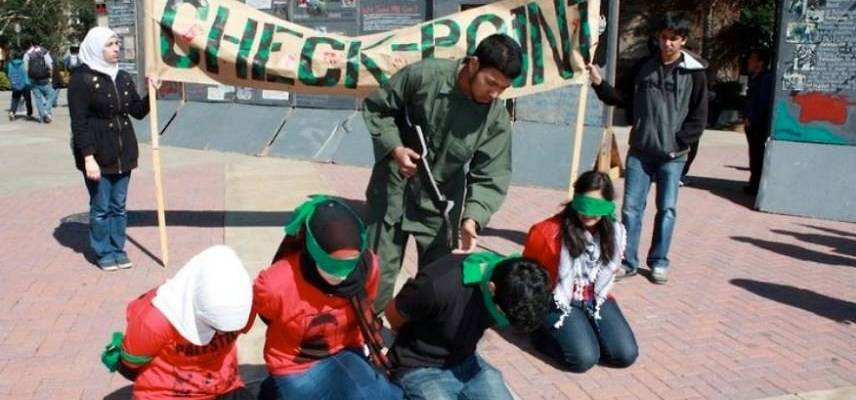Anti-Semitism “has contributed to the sense of siege felt by many Jewish college students. This is unacceptable and must change,” said ADL national president and CEO Jonathan Greenblatt.
By JNS
While most anti-Israel activism on college and university campuses come in the form of political expression, a significant segment of the activism reported in 2019 contributed to an atmosphere in which Jewish students felt under attack—and from which anti-Semitism sometimes emerged, according to an Anti-Defamation League report released on Wednesday.
The report comes as some campuses plan to reopen in the fall after moving all classes online due to the coronavirus global pandemic.
“We anticipate a significant uptick in anti-Israel activity once students are able to return,” said ADL national president and CEO Jonathan Greenblatt. “Some of the more radical expressions of anti-Israel sentiment that we witnessed last year morphed into outright anti-Semitism. Many of these manifestations left Jewish students feeling besieged and threatened.”
“At a time when anti-Semitism in the U.S. has spiked to historic levels and against the backdrop of COVID-19, which has revived old anti-Jewish conspiracies, college presidents and university administrators should take steps to prevent this prejudice from violating norms on campus and diminishing the educational experience of these students.”
According to the new report titled “Antisemitism and the Radical Anti-Israel Movement on U.S. Campuses in 2019,” anti-Israel rhetoric and activities on campuses often emerged from the campaigns calling for boycotting the Jewish state and the implementation of annual Israeli Apartheid Week programs.
Additionally, the report documented several events where pro-Israel or Jewish students felt threatened.
Anti-Israel groups on campuses receive much of their funding from student government resources, which generally are supported by student activity fees. They are also supported by outside donors, including foundations, some of whom have expressed their own anti-Israel positions.
In September, anti-Israel and pro-BDS activist Alison Weir, who has a long history of employing anti-Semitic tropes and associating with anti-Semites including white supremacists, delivered a lecture at Clovis Community College in California.
At an October student government meeting at the University of Illinois at Urbana Champaign, Jewish students were met with signs reading “Free Palestine F*** Zionists” as they argued against a resolution declaring that anti-Zionism is not anti-Semitism. The resolution ultimately passed.
One Jewish student reported that the negative impact of this incident was compounded when the student government president followed up the vote with a mass email expressing personal support for the resolution.
“Campus anti-Semitism has a significant impact on the morale of Jewish students and campus communities,” said Greenblatt. “It has contributed to the sense of siege felt by many Jewish college students. This is unacceptable and must change.”
‘Strongly condemn hate and extremism’
Moreover, the report highlighted that anti-Israel groups on campuses receive much of their funding from student government resources, which generally are supported by student activity fees. They are also supported by outside donors, including foundations, some of whom have expressed their own anti-Israel positions.
Most notable is the Rockefeller Brothers Fund (RBF), which provides significant funding to the anti-Israel group Jewish Voice for Peace. RBF also donates to the U.S. Campaign for Palestinian Rights and Grassroots Jerusalem, both of which have engaged in anti-Zionist rhetoric that has veered into extremism or anti-Semitism.
Another funder is the Westchester Peace Action Committee (WESPAC), which provides significant funding to Students for Justice in Palestine (SJP). WESPAC’s own website includes anti-Semitic content. SJP is also funded by American Muslims for Palestine (AMP), some of whose members have a history of making anti-Semitic remarks.
“At a time when so many prominent philanthropists and mainstream foundations are working actively to mitigate hate and the rise of division in society, it is disappointing that there are a select few who knowingly choose to contribute to organizations that stoke divisive propaganda campaigns that fail to advance understanding or promote peace,” said Greenblatt.
The ADL report calls on campus administrators and faculty to take a series of steps to address anti-Israel incidents and anti-Semitism on campus, including more accurate charting of trends in the ways bias manifests on campus; establishing a reporting mechanism to assist administrators and campus leaders in preventing incidents that rise to the level of criminal or civilly liable behavior; and programming to create a more equitable and inclusive campus.
“It is crucial that administrations and other campus leaders not equivocate, but strongly condemn hate and extremism,” states the report. “In recent incidents, this has proven to be very effective.”










